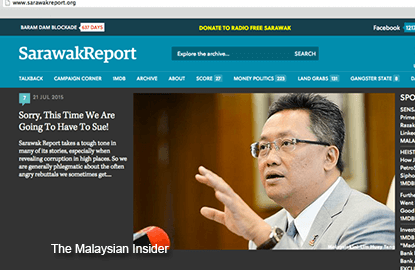

(July 22): The move by Malaysia's Internet regulator to block local access to whistle-blower website Sarawak Report can be challenged in court on the grounds of jurisdiction and also Putrajaya's guarantee against web censorship, lawyers said.
The Malaysian Communications and Multimedia Commission (MCMC) had blocked the UK-based website on Sunday evening, saying that its content, which included exposes on debt-ridden state investment firm 1Malaysia Development Bhd (1MDB), threatened "national stability".
However, personal data protection expert and lawyer Foong Cheng Leong told The Malaysian Insider that none of the provisions in the MCMC Act 1998 explicitly provided for blocking access to sites.
In justifying its decision, MCMC on Sunday said it had acted according to Section 211 and 233 of the MCMC Act. Both these sections provide for criminal prosecution against those who have been deemed to publish "offensive" content, or content that intends to "annoy" or "harass" any person.
Under both sections, an offender can be sentenced to not more than one year jail or RM50,000 fine, or both.
But Foong said the more relevant act that MCMC could have used to justify its action was Section 263, which said licensees, which were network providers, had the general duty to assist MCMC in preventing the network being in commission of any offence under Malaysian laws.
"This is the provision that is used to compel service providers to help block a website upon request by MCMC," Foong said.
However, even this section did not explicitly provide for the blocking of a website.
Service providers are not obligated by law to cede to requests to block certain cites, but they normally comply with such requests since MCMC regulates their licences.
"It is possible to bring this matter to the court and challenge it, one possibility is to say that this is ultra vires what is provided for in the act itself," Foong said.
Section 3 (3) of the same act states that the act does not allow for the censorship of the Internet, in line of the Multimedia Super Corridor (MSC) Bill of Guarantees, which promised the same.
"And because the act doesn't explicitly provide for blocking of a website, one can also argue that MCMC is acting beyond its scope (with the block)."
Another lawyer Melissa Sasidaran also agreed with the matter, saying that MCMC's act was ultra vires against its own law.
"Before they even block a site, they should give clear reasons for doing so and allow Sarawak Report to respond, not arbitrarily stifle information as they please," she told The Malaysian Insider.
She said Section 211 and 233 could not be used by MCMC to block sites as the said sections provided for "criminal sanctions".
"If Sarawak Report breached those sections, it is up to the Attorney-General whether to prosecute," she said.
Lawyers for Liberty (LFL) co-founder Eric Paulsen said challenging the matter in court would bring about a host of new issues, including whether Sarawak Report editor and founder Clare Rewcastle-Brown wanted to file such a challenge in Malaysian courts.
"If an organisation is a legitimate entity, its ban or closing down can be challenged in court, but it is up to the court if it wants to interfere and make interpretations of what is provided," he said.
The website was blocked shortly after allegations surfaced that it had tampered and forged 1MDB documents along with opposition leaders.
The accusation, made by a Sarawakian ex-journalist named Lester Melanyi, however, had been denied by Rewcastle-Brown, who said Lester, who claims to be a former editor for the site, had never worked there before. – The Malaysian Insider